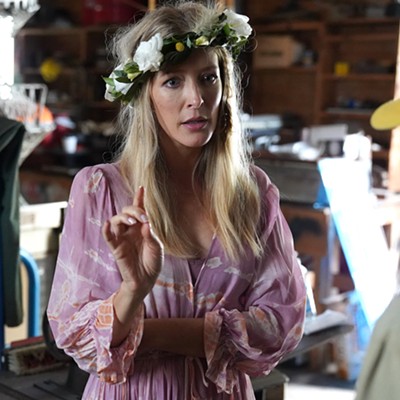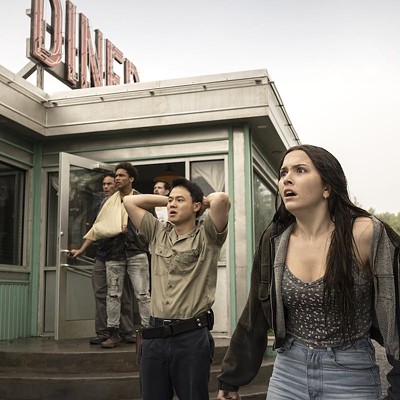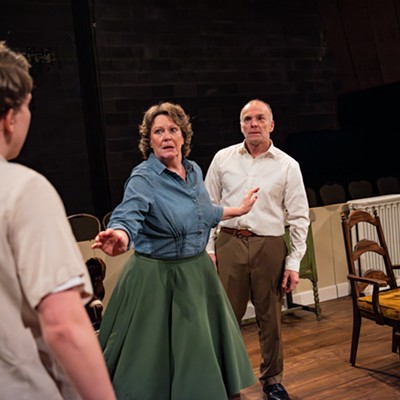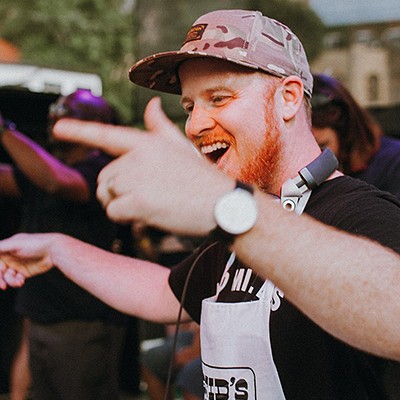“Really? That’s so cool!” a girl sitting behind me exclaimed when I joked to my friend that the only thing I like better than planes is snakes. The brilliance of Snakes on a Plane’s title (garnering it far more interest than mid-level action films of its ilk ever get) is how unpretentiously it lays out the basics. Its unsung triumph is that it’s about people.
Samuel L. Jackson’s marketable badass is part of a larger ensemble. Director David R. Ellis’s wit and timing lays out who everyone on that plane is. Ellis proved his eye for satire in Cellular and finds a new approach in Snakes on a Plane’s gleeful mayhem.
Beginning with a helicopter shot over a beachfront locale so cliche it looks like it belongs in American Ninja VII, the B-movie aesthetic brings together a cross section of comedic figures. The plane’s first class section is reserved for the FBI’s Neville Flynn (Jackson) and the witness he’s escorting (Nathan Phillips). Everyone else is moved to coach. “Is it safe back there?” asks a Paris Hilton-like socialite (Rachel Blanchard) travelling with her carry-on lap dog. Also aboard: a hip-hop star modelled on P. Diddy and Kanye West (Flex Alexander), his fed-up assistants (Keenan Thompson and Keith Dallas), a cranky Brit (Gerard Plunkett), a kickboxer (Terry Chen) and a honeymooning couple.
Personalities clash, but everyone is ruled by unabashed selfishness. Sexual tensions are also running high. They’re then left to fend for their lives against predatory snakes. The recipe for a character comedy interrupted by merciless anarchy recalls Mars Attacks!, and though Snakes on a Plane flickers out in its last half-hour, it’s energetic fun: A comedic take on recent news-instilled fears of flight safety. David R. Ellis’ trash pic spirit locates funny nuances of human behaviour.
Little Miss Sunshine
Little Miss Sunshine is a comedy of despair formatted as a feel-good crowdpleaser. It works better than most movies with a quirky Sundance pedigree, and because filmmakers Jonathan Dayton and Valerie Faris aren’t quick to paint any of their characters as morally wrong. The dysfunction running through the family stems from everybody believing they’re behaving as reasonably as possible.
En route to young daughter Olive’s Little Miss Sunshine pagent, familial disconnect starts revealing itself in ways that are funny but never hateful. The father Richard (Greg Kinnear) lives by motivational speeches that have driven his teenaged son Dwayne (Paul Dano) to a Nietzsche-inspired vow of silence. Grandpa (Alan Arkin) is hooked on heroin, but cares about his family enough to give Dwayne some wizened, but socially unacceptable, advice on his sex life. Uncle Frank (Steve Carell) is trying to readjust to the world following his suicide attempt.
The weakness of Michael Arndt’s screenplay is the characters are contrived with defining quirks (oddly, the mother—Toni Collette—has been denied a struggle of her own). It’s only as a unit their idiosyncracies mean something. Olive (Abigail Breslin) dreams through her family’s sadness—she looks like the bumblebee girl from Blind Melon’s “No Rain” video—but Dayton and Faris don’t give her inner world the screen majesty they attained in The Smashing Pumpkins’ “Tonight, Tonight.” Like Accepted, Little Miss Sunshine promotes the dubious notion that rejecting common people and principles is a desirable form of individuality. It’s credit to the movie’s warmth that it sells the idea.
Give him some credit. write: [email protected]














